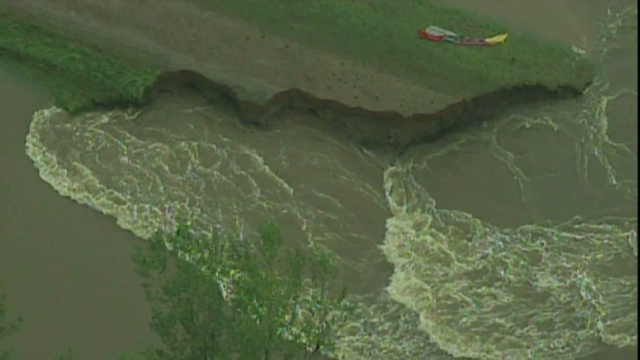 (CNN) -- The intentional breach of a levee on the Mississippi River is helping to ease unprecedented flood pressure on other areas, the U.S. Army Corps of Engineers said.
(CNN) -- The intentional breach of a levee on the Mississippi River is helping to ease unprecedented flood pressure on other areas, the U.S. Army Corps of Engineers said.
The Ohio River level had dropped about 1.7 feet at Cairo, Illinois, since Monday afternoon, before the blast, but that is expected to level off Wednesday.
The breach, created when engineers detonated explosives late Monday night at Birds Point, Missouri, is sending 396,000 cubic feet of water per second onto 200 square miles of fertile Missouri farmland.
The water is coursing across a floodway that Missouri Gov. Jay Nixon described as "literally the most productive part of our continent."
Two states grapple with rising floodwaters
Farmer Bryan Feezor said the sight makes you "sick to your stomach" as he surveyed his submerged fields.
"Farming is all I ever have done ... and it's under water," he told CNN affiliate KPLR. "I really don't know (what I'm going to do)."
A second levee blast was conducted Tuesday afternoon at New Madrid, Missouri, and a third is planned Wednesday near Hickman, Kentucky. The second and third blasts, downstream of Birds Point, will allow floodwater to return to the Mississippi River.
While the plan appeared to be working -- the level of the Ohio River fell where it joins the Mississippi -- record crests and relentless pressure from millions of gallons of water still threatened communities throughout the Mississippi and Ohio river valleys.
Vicksburg, Mississippi, could see water levels rise 4 feet by Sunday. Authorities told residents of Caruthersville, Missouri, that sandbags may not be enough to control the water.
Corina Jolley, of Sikeston, Missouri, said she grew up in Dorena, Missouri, which she said was being inundated by the breach on the Mississippi River.
A tombstone rests above the remains of her father and uncle, but "I'm sure we'll never see it again," said Jolley, who said residents of the rich farmland will be out of luck, as opposed to those in Cairo, for whom the risk has been lessened by the breaches.
"Whoever thought it would be this bad?" she said.
The situation was especially perilous for a 93-year-old woman who was caught in the swollen waters of the Black River near Poplar Bluff, Missouri, where two members of the Missouri National Guard rescued her from a partially submerged car.
"We weren't there to be heroes," said Sgt. Tim Bridges. "We were just doing our jobs." Bridges, along with Spc. Junior Bombard, waded through the rushing, muddy waters to ferry the woman to safety.
This "is the reason why I signed up for the Guard," said Spc. Junior Bombard.
The town of Cairo remained under a mandatory evacuation despite the intentional breach, while six other communities were under voluntary evacuation notices, said Patti Thompson, spokeswoman for the Illinois Emergency Management Agency.
"We're definitely not out of the woods yet," she said. "The levees are all very saturated right now and they're going to continue to have a lot of pressure on them for several days."
Even with the levee breach, the National Weather Service continues to predict record or near-record flooding in parts of southern Illinois, southwest Indiana, western Kentucky and Tennessee, southeastern Missouri, northeastern Arkansas, and parts of Mississippi and Louisiana.
Maj. Gen. Michael Walsh, commander of the Corps' Mississippi River Valley Division, made the decision to order the breach. He warned that without punching a hole in the levee, massive flooding would threaten to inundate communities throughout the Mississippi and Ohio river valleys.
"There's a tremendous amount of pressure on the system," he told reporters Tuesday evening. "The project operated as designed."
It was a controversial decision. Missouri officials took the Corps to court over the plan, questioning the agency's authority to intentionally breach the levee. The state argued the floodwater would deposit silt on the estimated 130,000 acres, and years, along with millions of dollars, would be required to fix the damage.
The U.S. Supreme Court declined to intervene in the case on Sunday, clearing the way for Walsh to blow the levee.
Some Missouri residents were angered by the decision, saying it would destroy their communities and provide questionable benefit. But others felt the decision was for the best.
"Yeah, we lost ... acres of farm land here in Missouri," said Sikeston, Missouri, resident Patricia Mobely, who recently fled the drought and firestorms of Texas for what she thought would be a more peaceful life in the Midwest. "But how much more would we have lost if we hadn't done it?"
"The sacrifice that these people are making is for the greater good," Jim Pogue with the Army Corps of Engineers told KPLR. "Their sacrifices are going to benefit hundreds of thousands of people all through this region. It's not just Cairo. It's people all through this part of the country."
Walsh called the decision to inundate the farmland and about 100 homes "heart-wrenching."
"I've been involved with flooding for 10 years and it takes a long time to recover from something like this," he said.



